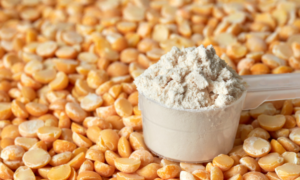September 19th, 2022
The processing of proteinaceous crops requires industrial processes, as developed by SiccaDania. Originally active in the dairy and starch industry, this company also supplies the technology for processing legumes into high-quality protein.
The increase in the world population explains the increasing pressure on the availability of animal proteins. This leads to a growing demand for vegetable proteins. In the sixties, the United States began with the industrial processing of soybeans. This is because of the favourable cultivation properties and the high concentration of protein. In Europe, France and Belgium the focus was on the extraction of protein from peas. Meanwhile, the rest of Europe, Canada and China export protein extracted from soy and peas on a large scale.
Applications
Vegetable protein finds its way into various products, such as meat and dairy substitutes, food supplements, gels and coatings. Due to the increasing demand to be able to cope, and to be able to make protein on the different continents, companies and countries have begun looking at alternative crops. These include broad beans, chickpeas, lentils and mung beans, but also quinoa and rapeseed. Even by-products from the food industry, such as spent grains from beer production, have an interest.
Industrial processes
For the processing of these crops, industrial processes are required, such as those developed by SiccaDania. This company is originally active in the dairy and starch industry and has branches all over the whole world. SiccaDania has during the past few years made the strategic choice to bet on technology for processing legumes to high-quality proteins. SiccaDania has, with support from its Innovation Center in Birkerød (near Copenhagen, Denmark), developed complete processes.
One-In-All-Out

It’s not just for proteins, but also for the other components in the crops. Through the unique ‘One-In-All-Out’ process, the starch and fibre are also and, if desired, processed into food ingredients. The wastewater from the processing process can be discharged as low tax or even reused as clean process water. The residual flow can be reduced to a fertilizer for plants. The One-In-All-Out process has in comparison with other processes an almost twenty percent higher protein yield. This translates to a short payback period. SiccaDania is continuously working to improve the process efficiency and quality of the products (such as smell, taste, colour and texture).
Protein factory
SiccaDania supplies numerous sub-processes worldwide to protein producers. SiccaDania has also recently completed a factory for processing beans as well as potatoes. Early this year in Denmark, SiccaDania started building a protein factory based on broad beans. This includes the design, construction and installation of the complete process. This is done under full in-house project management. The ambition is the realisation of a completely closed process, without emissions and with minimal water and energy consumption.
For more information: info-nl@siccadania.com
The original article from BULK Magazine

